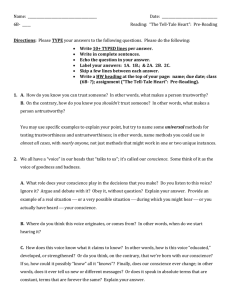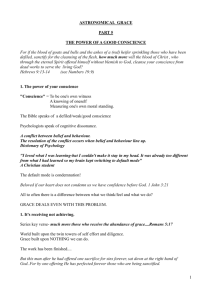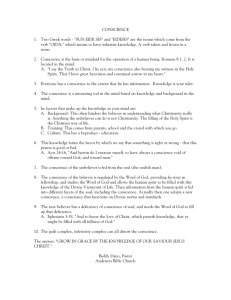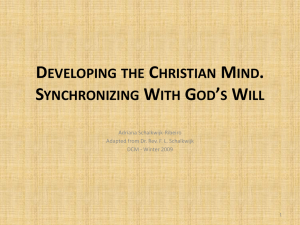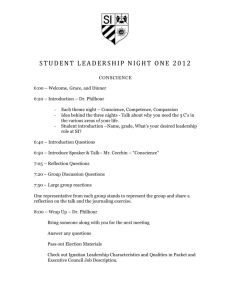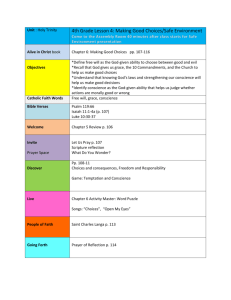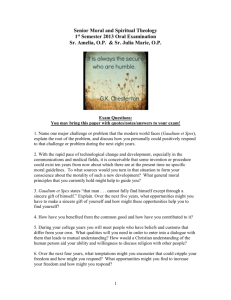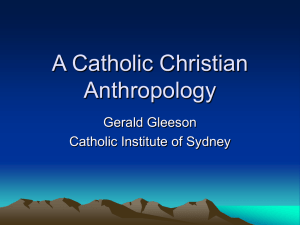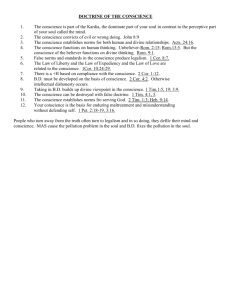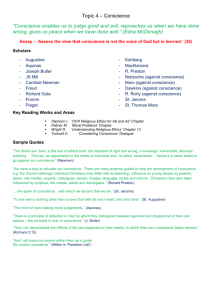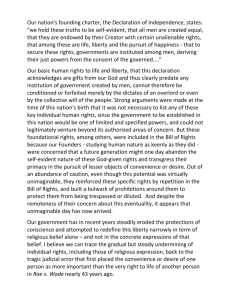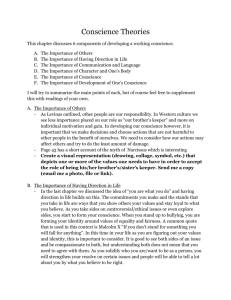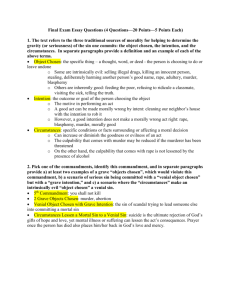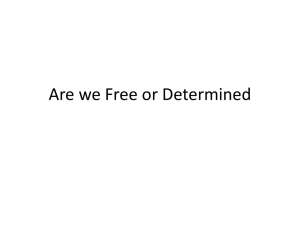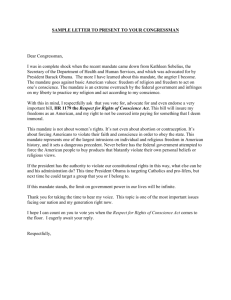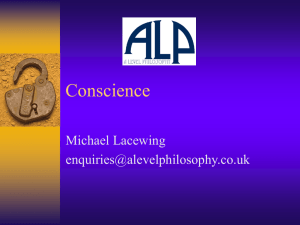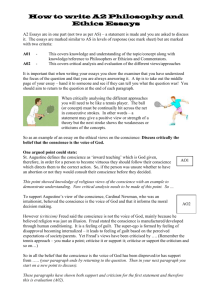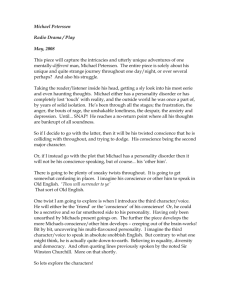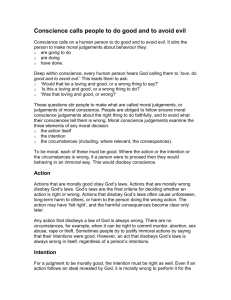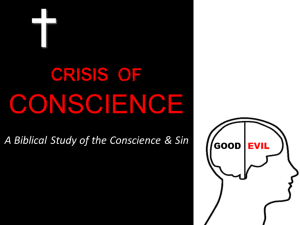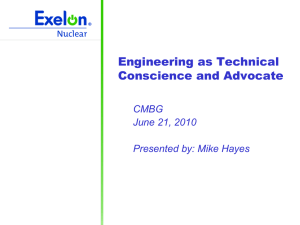Conscience: The Self in Search of The Good
advertisement
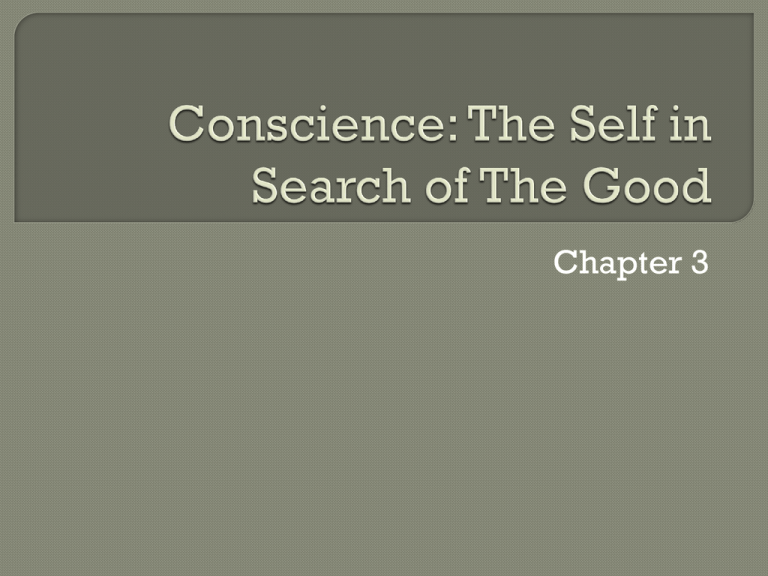
Chapter 3 Chapter 1, something at our very core seeks the good Chapter 2, the human is a moral agent Chapter 3, the importance of • Others • Having a direction in life • Character & one’s body • Conscience • Developing one’s conscience Am I my brother’s keeper? (Gen. 4.9) Are you responsible for your sister and brother? Western society doesn’t like “yes” as the answer • Freedom is seen as independence from others. Others can become “my hell” “I may choose to build bridges but that is wholly my decision. I don’t need others. I can be a full human being and free without them.” We are unique individuals But, we don’t need to see others as enemies of our autonomy The other makes it possible for us to be our true selves. See pages 42-43 of text An unhealthy love of self (see page 43) Knowing who you are means knowing where you stand Everyone stands somewhere You need to know your commitments, where you stand on the great issues Charles Taylor, in Sources of the Self, shows how a human lives a sense of direction Our moral orientation forms part of our identity We are framed by our commitments (e.g., R.C.) and our particular identifications (being Quebecois…) Name Statement of relationship Social role • Position • Career Our fundamental stance framed in terms of who we are Our stance in life shaped by a community that shares a common language There is no way we could be inducted into personhood except by being initiated into a language. Language contains & shares common experiences & commitments Think of the “inside joke” Incarnation Trinity Grace Eucharist Trinity • God a union of three persons: Father, Son & Holy Spirit • Three distinct persons in ONE God Hypostasis and prosopon (Greek & Latin) for “person”, referred to what one could see from the outside 1. Person: an individual with rights & responsibilities; a unique & autonomous individual who is conscious & can act 2. A meaning out of the expression of the persons of the Trinity united as one in God Love pours itself out toward another In God this breathing forth of love is a communion of love that is Father, Son, and Spirit. This love generated the Son and breathed forth the Spirit so that there are three persons. At the same time, this love binds the three into a unity. Person: the outpouring of love toward the other We are made in God’s image: i.e., by and for love Humans are social beings. Person essentially means “the self as relationship” “Do you not know that your body is a temple of the Holy Spirit within you, which you have from God?” (1 Cor. 6.19) “character” how your actions over time tend to become fixed in your body. (consider those who train for athletics muscle memory/strength/endurance, technique Moral fibre is like muscle fibre: the more you use it, the stronger your character See page 49 Repeating action becomes fixed takes root in you others see this as one of your character traits Read excerpt from Full Disclosure by William Safire on pages 49 & 50 What you believe & value, your habits, your moral principles your choices See excerpt from A Man for All Seasons p. 51 Conscience • The place where we hold ourselves in our own hands • A voice that calls us to “love and do what is good and to avoid evil.” • A law inscribed in human hearts by God • Our most secret core and sanctuary where we are alone with God whose voice echoes in depths Make own notes on “Conscience in the teaching of the Church” p. 52 Conscience in contrast to Freud’s concept of superego page 53 & 54 1. Conscience is a capacity to recognize right & wrong 1. A basic orientation to do good, an essential human trait 2. Sociopaths / psychopaths have no conscience 2. Conscience is a process of moral reasoning 1. Requires learning facts, values, how to reason 2. A life-long process 3. Seek out guidance from others 3. Conscience as judgment 1. Conscience is incomplete until acted upon See Gula’s chart on page 55, copy into your notes No simple answer Conscience develops • As you mature • As you take account of the norms & values of your tradition • As you deal with your failures, sins, weaknesses and your need of support from others and God • As you participate in prayer and sacrament (Eucharist, Reconciliation) • As you grow in the virtue of humility RATIONALIZATION TRIVIALIZATION MISINFORMATION THE END JUSTIFIES THE IMMORAL MEANS MEANS TO AN END DIFFICULT REASON Copy the diagram on page 58

